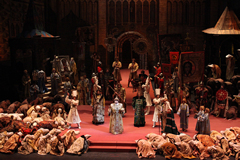| Opera Reviews | 26 April 2024 |
An historical revival of Boris Godunovby Silvia Luraghi |
|
| Mussorgsky: Boris Godunov Bolshoi Theatre 26 May 2016 |
|
|
The production was revived in 2011, and has been shown several times thereafter. As a result, the production, very traditional by current European standards, highlights the role of the people, rather than the monks, in the revolt, but also focuses on Boris, his tormented and introvert character, and his eagerness for power, as appropriate for a powerful man who has achieved a terrible misdeed and can hardly reckon with it. The original designs by Fyodor Fedorovsky were revived in 2011 by Alyona Pikalova (scenes) and Elena Zaitseva (costumes). They set the action as expected in medieval Russia, with the towering walls of the Novodyevichy Monastery on the background and the high vaults of the Kremlin in the prologue, then Pimen’s cell at the opening of the first act, and later a peasants’ tavern where Gregory on his way to Lithuania escapes being hung by the Tsar’s envoys. More traditional Russian scenes appear in the second act, with the Tsar’s children playing with a typical Russian nurse. The action then moves to the court of the Governor of Sandomir, father of the deceiving Marina, who seduces Gregory at the ball. The Polish nobles look appropriately cheating, not only on account of the 1948 directions, but basically in accordance with the indication of tradition and, more important, of Mussorgsky’s music. In the fourth act the people revolt, they at first try to also chase away the Poles, but the pretender manages to become the head of their upheaval. In Boris’ room, Prince Shuisky tells the story of Tsarevich Dimitri, and of doubts about his death. The tragedy reaches its summit in the end, with the dim lights surrounding Boris with a grievous aura, which in fact characterized him from the very first appearance. As is well known, Mussorgsky’s masterpiece underwent revisions by both the author as well as by other composers, and various versions have been shown around the world in recent and less recent years. The Bolshoi follows the most established tradition, presenting the four-act version with the orchestration of Rimsky-Korsakov. The orchestra audibly feels perfectly at home in this music, and at the performance it gave its best under the baton of Maestro Ainar Rubikis, who skillfully highlighted all the shades of Mussorgsky’s complex score. The opera is quite demanding for the vocal cast, starting with the sheer number of principals required. Through his music, Mussorgsky depicted a thoroughly worked out portrait of all characters, including smaller ones, and each singer must be able to comply with his intentions. The company was up to its task: a company of well-trained singer actors brought to life the wild passions that permeate the opera. Bass Vladimir Matorin was a ferocious yet reflective Boris, at moments repenting of his misdeed. Tenor Oleg Videman as Grigory had the appropriate rascal attitude, while bass Alexander Naumenko was an authoritative Pimen. Mezzo Elena Manistina lent her nicely colored voce to Princess Marina. I especially liked young tenor Stanislav Mostovoy in the minor role of the Simpleton. But in fact all singers deserve a mention, as well as chorus members, who played an important role in this production. The house had been long sold out, and the audience gave several signs of appreciation during the performance. One thing that strikes a newcomer is the apparently well-established use of projecting only English supertitles for Russian operas, something that is certainly a help for foreigners, but looks quite odd, and much less for the local audience, which is obviously predominant.
|
|
| Text ©
Silvia Luraghi Photo © Damir Yusupov / Bolshoi Theatre |

 The historical stage of Moscow’s Bolshoi Theatre offers a perfect venue for such an imposing opera as Modest Mussorgsky’s Boris Godunov. The current production also has an historical value of its own, dating back to 1948, when it premiered after a long delay (work on the production had started before the beginning of the Second World War), and various adjustments due to harsh criticism by the Soviet regime.
The historical stage of Moscow’s Bolshoi Theatre offers a perfect venue for such an imposing opera as Modest Mussorgsky’s Boris Godunov. The current production also has an historical value of its own, dating back to 1948, when it premiered after a long delay (work on the production had started before the beginning of the Second World War), and various adjustments due to harsh criticism by the Soviet regime. 





